|
|
|
Sort Order |
|
|
|
Items / Page
|
|
|
|
|
|
|
| Srl | Item |
| 1 |
ID:
191672
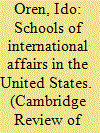

|
|
|
|
|
| Summary/Abstract |
Although disciplines are but one element of the institutional matrix of higher education, historians of International Relations (IR) rarely explore the field beyond its disciplinary context. To redress this lacuna, I sketch the history of professional international affairs (IA) schools in the United States. IA schools employ many IR scholars and train numerous practitioners, constituting a crucial interface between the IR academy and the policy world. When the social science disciplines were institutionalised at the turn of the twentieth century, the mission of training IR scholars momentarily eclipsed, but never extinguished, the commitment to training practitioners. During the twentieth century, this commitment increasingly found expression in interdisciplinary professional IA schools. I survey the emergence of IA schools, the growth of terminal master’s programmes within their walls, and the rapid growth of enrollments in these programmes. The expansion of IA education mirrored the spectacular growth of professional education on US campuses in areas such as law, business, nursing, and social work.
|
|
|
|
|
|
|
|
|
|
|
|
|
|
|
|
| 2 |
ID:
151245
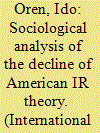

|
|
|
|
|
| Summary/Abstract |
In recent years the centrality of grand, paradigmatic theory in American IR has eroded, with the vacuum being filled by largely atheoretical “hypothesis-testing” research. Although a heated debate has emerged on whether it is good or bad for IR, hardly anyone has tried to analyze this trend. I offer an analysis grounded in a conceptual framework elaborated by sociologist Richard Whitley. In the 1980s and 1990s IR approximated the type of social organization Whitley labeled “polycentric oligarchy”—a hierarchic structure dominated by leaders of competing schools, toward which scholars orient their research. In recent years the field has become more of a “fragmented adhocracy.” Its reputational hierarchy has become more fluid and, concomitantly, its intellectual output has become more fragmented, more empirical, and less oriented toward a theoretical center. To account for this change, I discuss three external forces that reduce American IR's “reputational autonomy”: the corporatization of American higher education; a surge in the availability of research funding from the Pentagon and other defense agencies; and the enduring embeddedness of American IR in the political science discipline. To strengthen my argument, I compare American IR to its Australian counterpart on these three dimensions.
|
|
|
|
|
|
|
|
|
|
|
|
|
|
|
|
| 3 |
ID:
090674
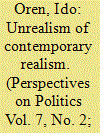

|
|
|
|
|
| Publication |
2009.
|
| Summary/Abstract |
Realist International Relations thinkers often intervene in political debates and criticize their governments' policies even as they pride themselves on theorizing politics as it "really" is. They rarely reflect on the following contradictions between their theory and their practice: if there is a "real world" impervious to political thought, why bother to try to influence it? And, is realist theory not putatively disconfirmed by the fact that realist thinkers have so often opposed existing foreign policies (e.g., the wars in Vietnam and Iraq)? I argue that these contradictions are not inherent in realism per se so much as in the commitment of contemporary realists to naturalistic methodological and epistemological postulates. I show that Hans Morgenthau and especially E. H. Carr, far from being naïve "traditionalists," have grappled with these questions in a sophisticated manner; they have adopted non-naturalistic methodological and epistemological stances that minimize the tension between realist theory and the realities of realists' public activism. I conclude with a call for contemporary realists to adjust their theory to their practice by trading the dualism underlying their approach-subject-object; science-politics; purpose-analysis-for E. H. Carr's dictum that "political thought is itself a form of political action."
|
|
|
|
|
|
|
|
|
|
|
|
|
|
|
|
| 4 |
ID:
109176
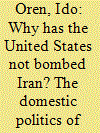

|
|
|
|
|
| Publication |
2011.
|
| Summary/Abstract |
Why has the United States (US), under both the Bush and Obama administrations, refrained from attacking Iran even though US officials have depicted the Iranian threat in all but apocalyptic terms and even though a loud chorus in Washington has been persistently calling for a preventive strike against Iran? I present an analysis-informed by Graham Allison's famous bureaucratic politics model-of the main political and bureaucratic forces in Washington acting to promote or impede a preventive attack on Iran's nuclear sites. I argue that America's abstention from attacking Iran should be understood not as a coherent national response to Iran's nuclear programme but rather as (in Allison's terms) an 'intra-national political outcome' resulting from the 'pulling' of 'Iran Threat' interests-primarily Vice President Cheney's camp in the Bush White House, members of Congress, and the American Israel Public Affairs Committee (AIPAC)-and the countervailing 'hauling' of the Pentagon, the military's top brass, the intelligence community and the Department of State. The main reason why neither the Bush nor the Obama administration has opted for a military strike is that the 'haulers', who were led by a formidable bureaucratic-political player, Secretary of Defense Robert Gates, have had the upper hand over the hawkish 'pullers'.
|
|
|
|
|
|
|
|
|
|
|
|
|
|
|
|
| 5 |
ID:
139580
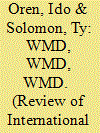

|
|
|
|
|
| Summary/Abstract |
We seek to reinvigorate and clarify the Copenhagen School's insight that ‘security’ is not ‘a sign that refers to something more real; the utterance [‘security’] itself is the act’. We conceptualise the utterances of securitising actors as consisting not in arguments so much as in repetitive spouting of ambiguous phrases (WMD, rogue states, ethnic cleansing). We further propose that audience acceptance consists not in persuasion so much as in joining the securitising actors in a ritualised chanting of the securitising phrase. Rather than being performed to, the audience participates in the performance in the manner in which a crowd at a rock concert sings along with the artists. We illustrate our argument with a discussion of how the ritualised chanting of the phrase ‘weapons of mass destruction’ during the run-up to the Iraq War ultimately produced the grave Iraqi threat that it purportedly described.
|
|
|
|
|
|
|
|
|
|
|
|
|
|
|
|
|
|
|
|
|